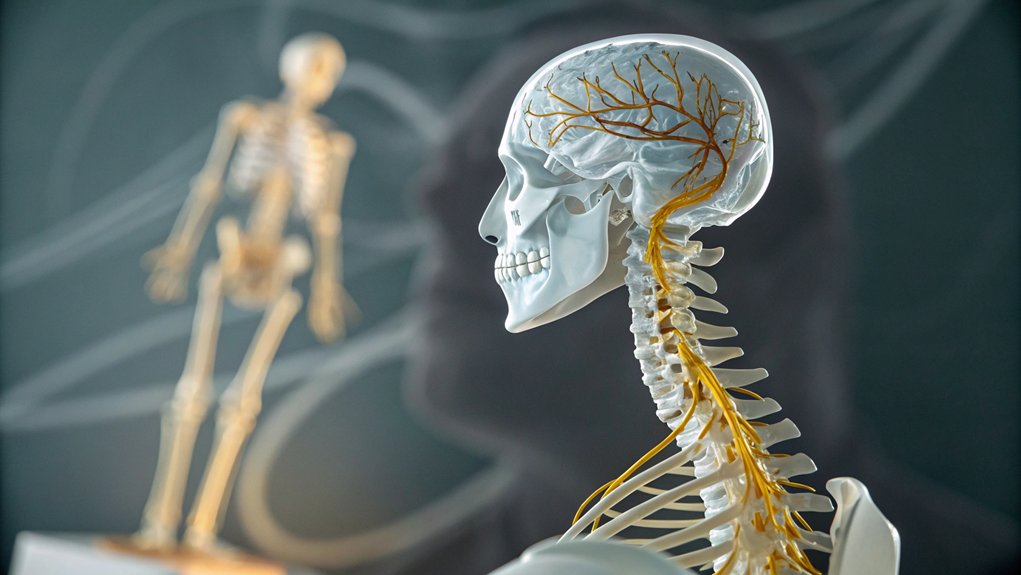Can a Pinched Nerve Cause Memory Loss?

Prefer listening? Check out the podcast version of this article.
Imagine you’re dealing with chronic nerve pain and suddenly find yourself forgetting simple things, like where you left your keys.
Could a pinched nerve really be behind this lapse in memory?

The connection between nerve compression and memory loss might seem unlikely at first.
However, understanding how disrupted nerve signals can lead to neuroinflammation offers a glimpse into this complex puzzle.
Are there specific risk factors that could make memory impairment more likely in your situation?
Let’s explore the surprising ways a pinched nerve might impact your cognitive health and what you can do to address it.
Table of Contents
Understanding Pinched Nerves
When discussing pinched nerves, it’s essential to understand that they occur when excessive pressure is applied to a nerve by surrounding tissues, such as bones, cartilage, muscles, or tendons.

This condition can disrupt the normal function of the nerve, often leading to compression symptoms like pain, tingling, numbness, or muscle weakness.
In terms of nerve anatomy, it’s crucial to recognize that nerves are delicate structures responsible for transmitting signals between the brain and the body.
Discover Your Path to a Longer, Healthier Life!
Take our free quiz to see how your lifestyle measures up to the world's longest-living communities and receive expert tips for a healthier, longer life.
Take the QuizWhen compressed, these nerves fail to function optimally, potentially leading to a range of symptoms depending on the affected nerve’s location.
The severity and type of compression symptoms can vary, highlighting the importance of a precise diagnosis to address the underlying causes effectively.
Mechanisms of Memory Loss
While pinched nerves may initially seem unrelated to cognitive function, the underlying mechanisms reveal a compelling correlation with memory loss.
Neural pathways become disrupted when nerves are compressed, leading to inflammation that affects brain function.
This neuroinflammation is a key contributor to cognitive decline, as it interferes with the normal processes of memory formation and retrieval.
Chronic pain from pinched nerves can further complicate the situation by impacting the hippocampus, which is crucial for converting short-term memories into long-term ones.
The resulting cognitive decline manifests as difficulties with concentration and memory retention.
Understanding these mechanisms highlights the importance of early intervention to prevent long-term cognitive complications associated with pinched nerves, emphasizing the need for holistic treatment approaches.
Scientific Studies and Findings
Extensive scientific research underpins the connection between pinched nerves and cognitive impairment, particularly memory loss.
Studies reveal that neuroinflammation effects play a significant role in this relationship.
When nerves are pinched, they can trigger neuroinflammation, disrupting cognitive function by interfering with the brain’s communication pathways.

A Norwegian study conducted at Oslo University Hospital found significant cognitive impairment in patients with nerve damage compared to those with fibromyalgia and healthy controls.
The research revealed several key findings:
- 29 patients with nerve damage
- 44 patients with fibromyalgia
- 20 healthy controls
Further evidence indicates that nearly half of individuals with chronic nerve pain report diminished cognitive function, such as impaired concentration and memory.
These studies suggest that the influence of nerve compression extends beyond physical discomfort, highlighting the necessity for comprehensive treatment strategies addressing both neuroinflammation and cognitive dysfunction.
Types of Memory Impairment Related to Pinched Nerve
Memory impairment linked to pinched nerves manifests in distinct ways that are crucial to understand for effective treatment.
You might notice issues with working memory, which impacts your ability to temporarily hold and process information. This can make multitasking or following complex instructions challenging.
Short-term memory, responsible for recalling recent events, may also suffer, leaving you struggling to remember recent conversations or details.
Scientific evidence suggests these impairments arise independently of pain intensity, indicating that nerve compression itself disrupts cognitive functions.

It’s essential to recognize these symptoms early for targeted interventions.
Risk Factors to Consider
Several risk factors can heighten the likelihood of experiencing memory problems due to pinched nerves.
Age factors play a crucial role—older individuals often exhibit increased susceptibility to cognitive impairments when nerves are compressed.
This may be attributed to age-related degenerative changes in neural structures, exacerbating the effects of nerve compression.
Additionally, the nerve location significantly influences cognitive outcomes. Cervical nerve compression, due to its proximity to the brain, can lead to more pronounced cognitive disturbances compared to peripheral nerve issues.
Understanding these factors allows for a more targeted approach in assessing and managing the risk of memory loss associated with pinched nerves.
By considering age and nerve location, you can tailor interventions to mitigate potential cognitive impacts effectively.
Long-term Cognitive Effects
While chronic nerve compression can result in persistent cognitive challenges, understanding the mechanisms behind these long-term effects is crucial for effective management.
Lifespan Comparison Tool
Compare the life expectancy by the U.S. State
The long-term consequences of such compression may lead to sustained memory impairment, impacting your daily life. Neuroinflammation and disrupted neural pathways often contribute to this cognitive decline.
Building cognitive resilience becomes essential in mitigating these effects. Here are three key aspects to consider:
- Neuroplasticity: Leveraging the brain’s adaptability can aid in recovery and improve cognitive function.
- Chronic Pain Management: Addressing pain effectively may reduce its impact on memory retention.
- Early Intervention: Prompt treatment of nerve compression may prevent lasting cognitive deficits.
These insights underscore the importance of comprehensive strategies in managing the cognitive outcomes of nerve compression.

Treatment Approaches
Given the intricate link between pinched nerves and cognitive dysfunction, treatment approaches must be multifaceted and evidence-based.
Physical therapy plays a crucial role in alleviating nerve compression, which can reduce inflammation and potentially enhance cognitive function.

Techniques such as targeted exercises and manual therapy aim to relieve pressure on nerves, improving both mobility and cognitive clarity.
Concurrently, cognitive training should be integrated into treatment plans to address memory deficits directly.
By employing exercises that stimulate neuroplasticity, you can enhance memory recall and processing speed.
A dual-focused strategy offers a comprehensive framework for tackling both physical and cognitive challenges.
Prevention and Lifestyle Tips
To effectively prevent pinched nerves and their associated cognitive complications, it’s essential to incorporate evidence-based lifestyle modifications and preventive strategies.
Adopting healthy habits and practicing regular exercise can enhance nerve health and reduce inflammation.
Here are key strategies:
- Ergonomic adjustments: Utilize ergonomic furniture and tools to maintain proper posture, minimizing nerve compression risks.
- Stress management and mindful practices: Implement techniques such as meditation and breathing exercises to alleviate stress, which can exacerbate nerve tension.
- Sleep hygiene and proper hydration: Ensure adequate sleep and hydration to support neural function and cognitive resilience.
Additionally, engaging in cognitive training exercises can bolster memory and concentration.
Consistent application of these strategies fosters a proactive approach to maintaining neural and cognitive health, effectively mitigating potential complications from pinched nerves.
Future Research Insights
Future research should prioritize examining the role of inflammatory markers in the link between pinched nerves and cognitive dysfunction.
You can explore how neurotransmitter alterations contribute to memory impairments, offering insights into potential therapeutic targets.

Enhancing brain plasticity might provide a pathway for recovery, suggesting interventions that promote neural adaptation could mitigate both pain and cognitive symptoms.
Inflammatory Markers’ Role
Although the link between nerve compression and cognitive dysfunction is well-documented, the precise role of inflammatory markers remains a critical area of investigation.
Inflammatory response and neuroinflammatory pathways warrant further exploration to elucidate their impact on memory loss. The relationship between these markers and cognitive decline can be dissected into several key areas:
- Biochemical Signals: How do inflammatory markers trigger neuroinflammatory pathways that may disrupt cognitive processes?
- Pathway Interactions: What interactions exist between nerve compression-induced inflammatory responses and brain function?
- Clinical Implications: Can targeting inflammatory markers provide therapeutic benefits for cognitive symptoms associated with pinched nerves?
Neurotransmitter Impact Exploration
What role do neurotransmitters play in the link between nerve compression and cognitive dysfunction?
Neurotransmitters are crucial in maintaining efficient cognitive signaling by transmitting information across synaptic gaps. When a nerve is pinched, it can disrupt neurotransmitter pathways, leading to altered signaling processes.
This disruption may hinder the brain’s ability to process information, thereby affecting memory.
Research indicates that imbalances in neurotransmitter pathways, such as those involving glutamate and GABA, can contribute to cognitive deficits observed with nerve compression.
Investigating these pathways provides insights into potential therapeutic targets for cognitive dysfunction.
Future research should focus on how modulating neurotransmitter activity might alleviate cognitive impairments associated with nerve compression, offering a promising avenue for improving patient outcomes in cases of pinched nerves.
Enhancing Brain Plasticity
In exploring the potential for enhancing brain plasticity, researchers are delving into interventions that could facilitate recovery from cognitive deficits linked to pinched nerves.
Techniques like brain exercises and cognitive therapies are being evaluated for their role in memory enhancement.
Promising strategies include:
- Neurofeedback training: This focuses on modifying brainwave patterns to improve attention and memory.
- Mindfulness practices: These are shown to aid in stress reduction and cognitive flexibility.
- Physical rehabilitation and lifestyle adjustments: These aim for nutrition optimization and sleep improvement to support brain health.
Such interventions are grounded in an evidence-based framework, showing potential to boost neuroplasticity.
Conclusion
In understanding the link between pinched nerves and memory loss, it’s intriguing to note that chronic nerve pain sufferers report a 30% decline in memory-related tasks.
This highlights the neuroinflammatory impact on the hippocampus, crucial for memory. Early intervention is essential to counteract these cognitive effects.
By adopting targeted treatments and lifestyle changes, you can mitigate the risk of memory impairment, emphasizing the importance of ongoing research to further unravel these complex neurobiological interactions.

 972-393-1699
972-393-1699





